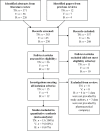Sex Differences in Smoking Cessation Pharmacotherapy Comparative Efficacy: A Network Meta-analysis
- PMID: 27613893
- PMCID: PMC5939704
- DOI: 10.1093/ntr/ntw144
Sex Differences in Smoking Cessation Pharmacotherapy Comparative Efficacy: A Network Meta-analysis
Abstract
Introduction: Converging clinical and biological evidence suggest sex is an important factor when selecting a pharmacological intervention for smoking cessation. The current investigation used network meta-analyses to estimate sex differences in the comparative efficacy of transdermal nicotine (TN), varenicline, and sustained release (SR) bupropion for smoking cessation.
Methods: Systematically searched previously published reviews and databases (Medline, PsycINFO, Embase) of randomized, double-blind, placebo-controlled trials of bupropion-SR, TN, and varenicline for cigarette smoking cessation in primary care/general community samples were included.
Results: Thirty-two studies met all criteria and 28 (88%) were included in the final analyses, representing 14 389 smokers (51% female). Results of the full sample (women and men combined) mirrored those from a Cochrane Tobacco Addiction Group network meta-analysis of smoking cessation pharmacotherapy, showing VAR>TN=BUP. All medications improved quit rates over placebo for both women and men. Relative to placebo, varenicline efficacy was similar for women and men. Significant sex differences were evident when comparing varenicline versus TN and varenicline versus bupropion. For women, varenicline was more efficacious than TN (RR = 1.41; 95% CI = 1.12,1.76) and bupropion (RR = 1.38; 95% CI = 1.08,1.77). For men, outcomes for those treated with TN and bupropion were similar to those treated with varenicline. There were no differences in efficacy when comparing bupropion versus TN.
Conclusions: The advantage of varenicline over bupropion SR and TN is greater for women than men. Clinicians should strongly consider varenicline as the first option treatment for women. Among men, the advantage of varenicline over TN or bupropion is less clear.
Implications: This study provides information for the sex-informed treatment of nicotine addiction among cigarette smokers. Relative to placebo, women and men achieved similar outcomes when treated with varenicline; however the advantages of varenicline over transdermal patch and bupropion were greater for women compared to men.
© The Author 2016. Published by Oxford University Press on behalf of the Society for Research on Nicotine and Tobacco. All rights reserved. For permissions, please e-mail: journals.permissions@oup.com.
Figures



References
-
- Jamal A, Homa D, O’Connor E, et al. Current cigarette smoking among adults - United States, 2005–2014. MMWR. 2015;64(44):1233–1259. - PubMed
-
- U.S. Department of Health and Human Services. The Health Consequences of Smoking - 50 Years of Progress: A Report of the Surgeon General. Atlanta, GA: U.S. Department of Health and Human Services, CDC; 2014. www.surgeongeneral.gov/library/reports/50-years-of-progress/ Accessed March 17, 2016.
-
- Carter BD, Abnet CC, Feskanich D, et al. Smoking and mortality—beyond established causes. N Engl J Med. 2015;372(7):631–640. doi:10.1056/NEJMsa1407211. - PubMed
Publication types
MeSH terms
Substances
Grants and funding
LinkOut - more resources
Full Text Sources
Other Literature Sources
Medical
Research Materials
Miscellaneous

